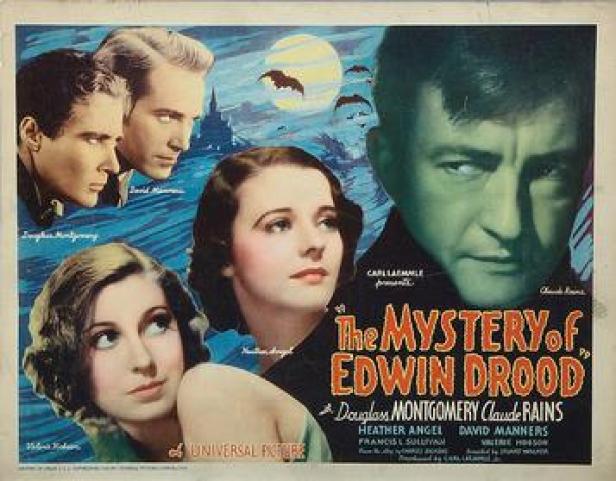Adaptations of Charles Dickens’s The Mystery of Edwin Drood are, in themselves, a bit of a mystery. The novel is hardly among Dickens’s best known or most loved works, largely due to the fact that Dickens never finished the book. But The Mystery of Edwin Drood is a brooding, gothic-tinged mystery about familial jealousy, drug addiction, and dark, barely named obsession, and provides an outline on which to impose an interpretation—including allowing the reader or filmmaker to come to their own conclusions about the intended culprit. The story deals in character psychology, the dark desires that lead an otherwise civilized person to murder—more a how-dunnit than a who. It is this element that the 1935 adaptation of the novel draws on, focusing more on the psychological complexities and intricate plans of the protagonists than on concealing the true killer.
The film opens on John Jasper (Claude Rains), who awakens in a London opium den run by Princess Puffer (Zeffie Tilbury). Jasper has been having strange visions of a cathedral tower and a young woman, haunted by his desire for her and his hatred of an unnamed rival. He leaves without paying for his final pipe and returns to his village of Cloisterham, where he’s a respected member of society, a choirmaster and music teacher, and loving uncle to Edwin Drood (David Manners), whom he raised from a child. Edwin is engaged to Rosa (Heather Angel), to whom he was promised as child; Rose also happens to be the object of Jasper’s hallucinations. But unknown to Jasper, Rosa and Edwin are not actually that fond of each other, something which is complicated with the arrival of Neville Landless (Douglass Montgomery) and his sister Helna (Valerie Hobson) from Ceylon, who have come to Cloisterham to finish their education. Neville immediately falls for Rosa and fights with Edwin, their conflict coming to a head when Edwin disappears on Christmas Eve, leading to a frantic search for his body and his killer.

Edwin Drood captures the fatalistic, gothic nature of the original text, exploring the psychologies of the main characters long before the central mystery is introduced. In an era with a number of Dickens adaptations, this one actually does stand out—in large part because of Claude Rains, a recent addition to the Universal stable, who had arrived in Hollywood in 1933 to play the Invisible Man. Rains is here further developing his persona as a likable villain, or villainous hero, playing Jasper as a man torn between his better nature and his far worse one, in ways both sympathetic and unlikable. The film plays out this concept of duality in each character.
For a film that doesn’t include any supernatural elements, The Mystery of Edwin Drood still flirts with horror concepts. Jasper descends into the cathedral crypt on a sinister mission, accompanied by Durdles (Forrester Harvey), a Dickensian character writ large, who builds on the grotesquery coming from Jasper himself. Jasper’s duality in particular, the barely curbed perversion and violence that lurks beneath a well-mannered façade, pushes him towards an almost a Jekyll and Hyde transformation, and elevates the film from an entertaining melodrama into a near horror film. This sense of horror and fatality courses throughout the story, emanating from Rains: Rosa speaks of being terrified without knowing why; Neville admits that he has a “vile temper” and has difficulty controlling himself; even the affable Drood is seething with barely controlled animosity towards those who seek to shape his life against his will. Much of the story centers around people entrapped by their society and by promises to the dead; there are even hints of a racial component to the conflict, as Drood refers to Neville as a “dark-skinned fellow” making a pass at “our women.”
The Mystery of Edwin Drood is far from the best Dickens adaptation of the period, but it does give life to a story that has always been a little loose and truncated. Director Stuart Walker provides some able structure and cinematic flourishes, but it’s a shame that this film didn’t fall into the lap of a James Whale or a Michael Curtiz, who could have further drawn out its perverted, dualistic core. Still, this new Blu-ray release from Kino gives needed exposure to a lesser-known film, one buoyed by a strong cast and guided by Rains, who hints at far darker depths.
The Mystery of Edwin Drood is available on Blu-ray from Kino Lorber.


